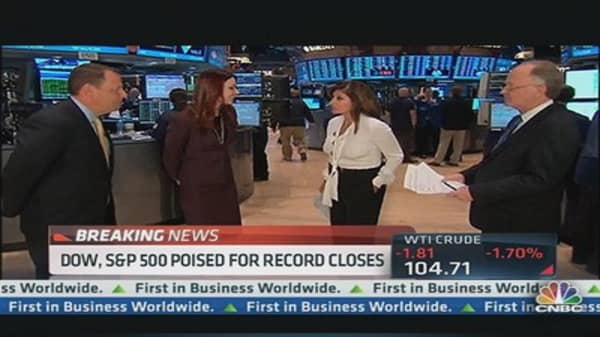The Fed chairman spoke after Wednesday's close, but his words resonated in markets around the world Thursday as traders took away reassurances that the central bank would not move any more quickly than expected to end its bond purchase program and, more importantly, that it is not moving up its time frame to raise short-term interest rates.
(Read More: Gold Nears $1,300, but Analysts Say It's Not a 'Buy')
Treasury yield rates slipped after Bernanke spoke and continued to fall Thursday, with the 10-year at 2.57 percent in late trading. But yields at the long end steadied and stocks got a further boost after the Treasury released data showing the biggest June budget surplus ever—$117 billion, against analysts expectations of $39.5 billion.
The Dow closed up 169 at 15,460, besting its previous high close of 15,409 on May 28. The S&P 500 jumped 22 to 1675, topping the May 21 close of 1669.
The next target traders are watching for the Dow is the May 22 all-time intraday high of 15,542, and for the S&P, it is the 1687 level from May 22. The Nasdaq, meanwhile, has been quietly outperforming, and it is up 11 of the last 12 sessions. The Nasdaq rose 1.6 percent to 3578 Thursday, and it is up more than 5 percent for the month so far.
"It's a nice move. I didn't expect it," said Laszlo Birinyi of Birinyi Associates. The milestones for the Dow and S&P are not that meaningful, he said, though he remains bullish and expects the S&P to be at 1700 by year-end. Stock traders have been keeping a wary eye on Treasury yields, which had hit a high above 2.7 percent last week.
"I'm not concerned about rates because the market is not concerned about rates. What I will be concerned about is when the market sells off with no news," Birinyi said.
The market may be pricing in something new now that it has managed to score big gains even as interest rates hold at higher levels, Birinyi said. "Maybe they're pricing in part 2—that things are getting better." He pointed to interesting moves in stocks, like Amazon, which crossed 300 for the first time Thursday, and Priceline.com, up 18 points, or 2 percent.





